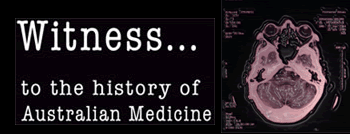


The development of microvascular surgery in Australia
Introduction
Participants
Beginnings
Developing links with academia and hospital medicine
A bevy of supporters
An ever-widening circle of contributors
Building research capacity
Nurturing relationships
Raising funds for research and development
The microsurgeon and the law
Winning community and corporate support
Leadership
The Institute and its style
Endnotes
Index
Search
Help
Contact us

Ann Westmore: One person who we haven't heard from is Barry OíCallaghan, who has been involved with the institute for many years.
Barry O'Callaghan: Iím a lawyer and Iíve been associated with the OíBrien family, the Microsurgery Foundation and the Bernard OíBrien Institute for 30 or 40 years. Over that time, Iíve acted with Bernard on many interesting exercises. Iím limited in what I can say because of the solicitor/client relationship that continues on permanently. I still regard Joan [OíBrien] as one of my clients. I remember at Bernardís funeral when John Connell delivered the eulogy Ė unfortunately John was not able to come today; he dropped me a note to wish everyone well Ė he spoke beautifully and movingly about Bernard and of course they knew each other for years. So if someone has a copy of Johnís notes, they would be well worth looking at.[81]
I came to act for Bernard and the Microsurgery Institute more generally after taking over from one of my former partners, John Lewis, who is still alive although he's not brilliantly well Ė heís well into his eighties now. Iím pretty sure that John Lewis would have come into it because of his association, and our firmís association, with Rob Monohan who was involved in the establishment of the Institute. The Foundation started for the purposes of having a separate legal entity to raise the funds, probably on the Boardís recommendation. As a result of that Rob Monohan would have spoken to John Lewis and hence the Foundation emerged from that. When John Lewis retired from Corrs Ė or perhaps before that Ė I took over. That would be some time in the 1970s.
I knew constantly the tension between Bernard on the one hand and some of the senior [Hospital] management on the other. Bernard was such an enthusiastic person that he captured everyone's imagination. For lay people like me, this guy OíBrien at St Vincentís was fascinating because if your arm was chopped off he could stick it back together again and get it working. In a way he had an unfair advantage, because this just captured the publicís imagination and with that came interest and funding. He was on a lay down misere that if he could tell the story he was going to win. And he did. He told it brilliantly and very successfully.
Ann Westmore: Presumably you were involved in the discussion with the Hospital about negotiating this entity that was going to have its independence yet still have a close working relationship with the Hospital? You must have seen some interesting dynamics.
Barry O'Callaghan: Well, you do [see some interesting dynamics]. On the one hand, the Hospital owns the site and needs to have overall control of whatís happening on its campus. On the other, it canít be a dog in the manger because it knows, particularly in this case, that one of the driving forces internationally and with a highly justified reputation is Bernard himself. On the one hand, they might have wished to say, 'You get out of here, youíll do what youíre toldí. On the other, they knew very well they couldnít afford to let him go - he was just too valuable to the Hospital. So you had that continuing tension, but there were two sides to every question.
Laurie Muir: Ann, there are in the records, Barry's letters of advice at that time. I think it was in the early 1970s. This whole issue is summarised beautifully of the delicacy of dealing with the Sisters of Charity who owned the property and us, imposing our genius upon them. And all the publicity that went with Bernardís genius that caused ructions within the profession, more broadly than just at St Vincentís.
Ann Westmore: Yes, I imagine that issue of self-advertising would come into it. So how was that resolved? What advice did Barry give?
Laurie Muir: It made 'Weary' [Dunlop] and Bernard closer and closer friends. (laughter) They both had the same issue.
Barry O'Callaghan: Itís interesting looking back on it now as a lawyer. Bernard really didnít have to tout, he just did it naturally, he was just so good in the field, he just captured everyoneís imagination. Basically, people flocked to him. And I can well imagine fronting up to Dick Hamerís office. You didnít really have to tell the story much, it just happened. Any governmentís going to say, 'Weíre on a winner here, so weíre going to back himí.
Ann Westmore: Well, what sort of advice would you give in that situation where you've got, say, a Medical Board, saying thereís too much self-promotion?
 |
Witness to the History of Australian Medicine |  |
© The University of Melbourne 2005-16
Published by eScholarship Research Centre, using the Web Academic Resource Publisher
http://witness.esrc.unimelb.edu.au/062.html